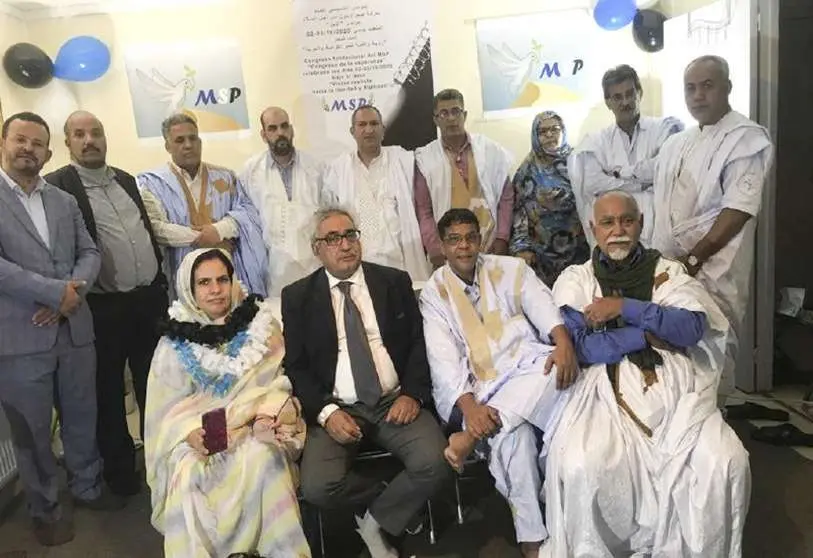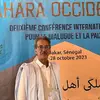Sahrawi Peace Movement, an opportunity for Western Sahara

In April last year, the formation of a new political organisation was announced under the name of the Sahrawi Movement for Peace (MSP), which emerged from the bowels of the now fading Polisario Front. Most of the first hundred signatories of the founding manifesto are senior and middle-level cadres who for decades held various political, diplomatic and military functions in the old political-military movement that led the anti-colonial struggle in the North African territory, known until then as Spanish Sahara, in mid-1975.
Although the vast majority of Saharawis became involved in support of Polisario's claims against the Spanish colonial presence, it is no less true that in this international context, marked by the Cold War, the immaturity of the young leaders of the armed movement, inflamed by the revolutionary ideas of the Saharawi people, was not enough, inflamed by revolutionary and leftist ideas, very much in vogue at the time, made them disregard any principle of moderation or prudence and fall into the arms of the local allies of the Soviet camp, namely the Libyan leader Muammar Gaddafi, in the first stage, and the Algeria of the FLN, later on.
In Latin America, the Polisario's cause was then known and glittered, especially among the progressive political class. This coincided with the fall of the dictatorships in the Southern Cone and the growing role of the Non-Aligned Movement, whose main actors in the region, Cuba and Panama, under the leadership of Omar Torrijos, acted as benefactors of the revolutionary project of the North African guerrilla leaders. It then felt the effects of the triumph and sudden decline of Chavism and the progressive tide it generated in the continent. With the passage of time, the Saharawi issue has lost its lustre, except in some marginal sectors of the Latin American radical left.
The Polisario's betting on the losing side of the East-West conflict has been and continues to be the main cause of the decline of its project. Faced with the revolutionary regime that the Polisario sought to establish on the Atlantic coasts, an area of influence and of extreme sensitivity for NATO, Morocco took a stand, using historical and legal arguments, more or less debatable, but with the backing of powerful Western allies. The result is what we see today. Most of the territory and its resources under Moroccan control, while the Polisario barely survives, in a vegetative state, in a desert strip without water. Having lost Libya's support and weakened Algeria's, and in full diplomatic retreat, it has been forced to accept, from a position of weakness and without strong alliances, a peace process under the auspices of the UN which, thirty years later, has been swinging in favour of the other side.
Polisario has suffered from the strategic mistakes it has made, including its unfortunate and foolish bet on the losers of the Cold War in North Africa. As if that were not enough, its inability to adapt and renew itself, its arrogance in the face of critical voices in favour of greater internal democracy, plus the revelation of atrocious crimes committed by some leaders in the early years of the war, ended up taking their toll on what remained of its credibility and representativeness.
It was at this juncture that the Sahrawi Movement for Peace emerged on 22 April last year, establishing itself as the first democratic, independent and genuine political force within Sahrawi society. Its founding Congress was held in the midst of the pandemic, in the first week of October, with the participation of 170 delegates representing the militants, hundreds of whom were affiliated in those first six months. The presence of the former Spanish Prime Minister, José Luis Rodríguez Zapatero, as guest of honour gave the event an international dimension and at the same time strong moral and political support for the new Movement.
After a process of exhaustive reflection and re-evaluation, the Movement has set out to open up a new path, opposed to the armed route and in favour of a compromise solution, in the conviction that this path is perhaps the only viable option to get our people out of the tunnel in which they have been trapped for fifty years. In addition to the loss of human lives and the dismemberment of families caused by this adventure, a large Sahrawi population is still suffering from exile, living in refugee camps in extreme conditions in the remote desert of Tindouf.
The MSP has thus emerged to respond to an unavoidable historical appointment, to an unavoidable need determined by the pain, the lack of expectations and the uncertainty that reign among our people due to the prolongation of the conflict and the paralysis of the UN peace process. The dialogue launched in Geneva at the end of 2018 remains suspended after the resignation, two years ago for mysterious reasons, of the last UN special envoy, former German President Horst Koeler. Efforts to appoint a new envoy have so far failed due to a lack of agreement between the parties. Several mediators have already been challenged, the last of whom, Luis Amado, the former Portuguese foreign minister, was refused by Algeria and the Polisario to endorse his candidacy, thus returning to square one and back to the vicious circle.
Despite the presence of blue helmets in the territory, stability remains fragile and at permanent risk, especially after the announcement of the Polisario's breaking of the ceasefire last November and the sporadic skirmishes around the defensive wall where a senior military commander was recently killed in a Moroccan drone attack. On the other hand, it should not be overlooked that the territory borders the Sahel area where various terrorist organisations operate. The long and complex conflict in Libya has had a direct impact on the whole area due to the possibilities of access to weapons, vehicles and military equipment of all kinds.
The Saharawis are realising that they can no longer remain confined to the role of "supporting actors", a sort of "extras" on the set of an eternal clash between rival regional powers, as happened to the "Mujahedin Khalg" between Iran and Iraq or the Kurdish factions between Syria and Turkey. Faced with this reality, the PSM has proposed to step forward and, based on a different, moderate and rational approach, to enter "unexplored" areas in order to find a compromise solution, an agreement in which there are no losers and no winners. For the priority is to save our people, to put an end to their endless journey to nowhere.
From common sense and far from populist sophistry and utopian projects, the activists and leaders of the new Movement have decided to put our feet on the ground and begin this journey in search of formulas for understanding and coexistence with the Kingdom of Morocco from the conviction that there is no alternative, without this implying the renunciation of fundamental rights and demands of the Saharawis. We believe that the Moroccan proposal for autonomy, with due guarantees, can be a starting point and not the last stop in the transition to a model of coexistence, necessary and urgent, between Saharawis and Moroccans. In the MSP, we also have the right to dream and to proclaim "we can" in order to find the honourable way out that will put an end to the ordeal of our people and provide them with a future of peace, dignity and well-being other than war and exile.
Hach Ahmed /First secretary of the MSP

